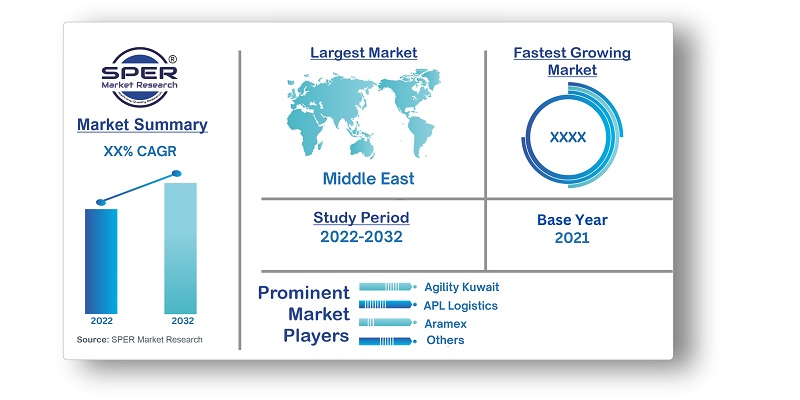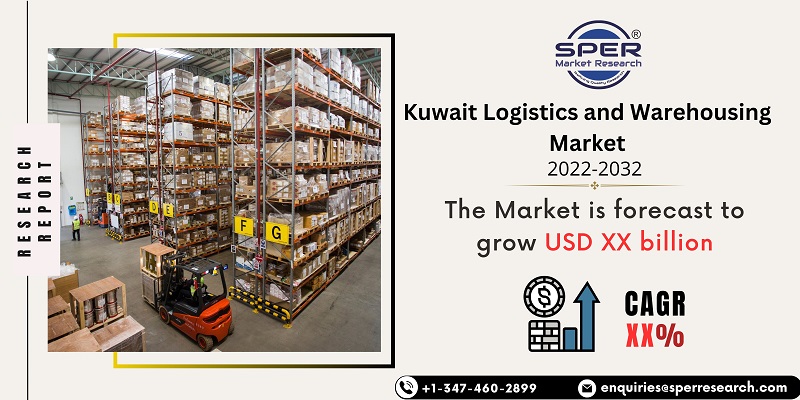
Kuwait Logistics and Warehousing Market Growth, Share, Trends, Revenue and Future Scope 2032
Kuwait Logistics and Warehousing Market Size- By Captive and Logistics Companies, By Licensed and Non-Licensed Warehouse, By Grade, By Commercial Models, By Warehouse Type, By End User, By Consumer E-Commerce- Regional Outlook, Competitive Strategies and Segment Forecast to 2032
| Published: Mar-2023 | Report ID: AMIN2343 | Pages: 1 - 102 | Formats*: |
| Category : Automotive & Transportation | |||
- Geographic Location: Kuwait's strategic location in the Middle East makes it a center for logistics and business within the area. It acts as a crossing point for the nations of the Gulf Cooperation Council (GCC) and the rest of the world. It is a desirable location for logistics and warehousing operations due to its closeness to important shipping routes and access to the Arabian Gulf.
- Increasing E-commerce Sector: Kuwait, like various other nations, is seeing a quick increase in e-commerce. The popularity of online shopping and the growth of regional e-commerce platforms have increased the need for effective warehousing and logistics solutions. In order to meet the rising demand for last-mile delivery, warehousing, and fulfillment services, logistics firms are boosting their operations.


| Report Metric | Details |
| Market size available for years | 2019-2032 |
| Base year considered | 2022 |
| Forecast period | 2022-2032 |
| Segments covered | By Captive and Logistics Companies, By Licensed and Non-Licensed Warehouse, By Grade, By Commercial Models, By Warehouse Type, By End User, By Consumer E-Commerce |
| Regions covered | Seoul, Busan, Incheon, Daegu, Ulsan. |
| Companies Covered | Agility Kuwait, APL Logistics, Aramex, City Group, DHL Kuwait, DSV, KGL Logistics Kuwait, TransCrate Logistics |
- International Domestic Freight Forwarders
- Logistics Companies
- Logistics Consultants
- Warehousing Companies
| By Captive and Logistics Companies: |
|
| By Licensed and Non-Licensed Warehouse: |
|
| By Commercial Models: |
|
| By Warehouse Type: |
|
| By End User: |
|
- Kuwait Logistics and Warehousing Market Size (FY’2022-FY’2032)
- Overview of Kuwait Logistics and Warehousing Market
- Segmentation of Kuwait Warehousing Market By Captive and Logistics Companies (Captive Companies, Logistics Companies)
- Segmentation of Kuwait Warehousing Market By Licensed and Non-Licensed Warehouse (Licensed Warehouses, Non-Licensed Warehouses)
- Segmentation of Kuwait Warehousing Market By Grade (Grade A, Grade B and others)
- Segmentation of Kuwait Warehousing Market By Commercial Models (Built to Suit Model, Long Term Leasing Model, Rental Models by 3PL)
- Segmentation of Kuwait Warehousing Market By Warehouse Type (Agriculture, Cold Storage, Dry & Ambient, Open Yards, Other Warehouses)
- Segmentation of Kuwait Warehousing Market By End User (Automotive and Industrial Equipment, Consumer E-Commerce, Consumer Retail, Food & Beverages, Healthcare, Others)
- Segmentation of Kuwait Warehousing Market By Consumer E-Commerce (Dark Kitchens/Stores, E-Commerce Delivery Stations, Others)
- Statistical Snap of Kuwait Logistics and Warehousing Market
- Expansion Analysis of Kuwait Logistics and Warehousing Market
- Problems and Obstacles in Kuwait Logistics and Warehousing Market
- Competitive Landscape in the Kuwait Logistics and Warehousing Market
- Impact of COVID-19 and Demonetization on Kuwait Logistics and Warehousing Market
- Details on Current Investment in Kuwait Logistics and Warehousing Market
- Competitive Analysis of Kuwait Logistics and Warehousing Market
- Prominent Players in the Kuwait Logistics and Warehousing Market
- SWOT Analysis of Kuwait Logistics and Warehousing Market
- Kuwait Logistics and Warehousing Market Future Outlook and Projections (FY’2022-FY’2032)
- Recommendations from Analyst
1.1. Scope of the report1.2. Market segment analysis
2.1 Research data source2.1.1 Secondary data2.1.2 Primary data2.1.3 SPER’s internal database2.1.4 Premium insight from KOL’s2.2 Market size estimation2.2.1 Top-down and Bottom-up approach2.3 Data triangulation
4.1. Driver, Restraint, Opportunity and Challenges analysis4.1.1 Drivers4.1.2 Restraints4.1.3 Opportunities4.1.4 Challenges4.2. COVID-19 Impacts of the Kuwait Warehousing Market
5.1. SWOT analysis5.1.1 Strengths5.1.2 Weaknesses5.1.3 Opportunities5.1.4 Threats5.2. PESTEL analysis5.2.1 Political landscape5.2.2 Economic landscape5.2.3 Social landscape5.2.4 Technological landscape5.2.5 Environmental landscape5.2.6 Legal landscape5.3. PORTER’S five forces analysis5.3.1 Bargaining power of suppliers5.3.2 Bargaining power of Buyers5.3.3 Threat of Substitute5.3.4 Threat of new entrant5.3.5 Competitive rivalry
5.4. Heat map analysis
6.1 Kuwait Warehousing Manufacturing Base Distribution, Sales Area, Product Type6.2 Mergers & Acquisitions, Partnerships, Product Launch, and Collaboration in Kuwait Warehousing Market
7.1 Captive Companies7.2 Logistics Companies
8.1 Licensed Warehouses8.2 Non-Licensed Warehouses
9.1 Grade A9.2 Grade B and others
10.1 Built to Suit Model10.2 Long Term Leasing Model10.3 Rental Models by 3PL
11.1 Agriculture11.2 Cold Storage11.3 Dry & Ambient11.4 Open Yards11.5 Other Warehouses
12.1 Automotive and Industrial Equipment12.2 Consumer E-Commerce12.3 Consumer Retail12.4 Food & Beverages12.5 Healthcare12.6 Others
13.1 Dark Kitchens/Stores13.2 E-Commerce Delivery Stations13.3 Others
14.1 Kuwait Warehousing Size and Market Share by Region (2019-2025)14.2 Kuwait Warehousing Size and Market Share by Region (2026-2032)14.3 Ardiya14.4 Jahra14.5 Mina Abdullah14.6 Shuwaikh14.7 Sulaibiya14.8 Others
15.1 Agility Kuwait
15.1.1 Company details15.1.2 Financial outlook15.1.3 Product summary15.1.4 Recent developments15.2 APL Logistics15.2.1 Company details15.2.2 Financial outlook15.2.3 Product summary15.2.4 Recent developments15.3 Aramex15.3.1 Company details15.3.2 Financial outlook15.3.3 Product summary15.3.4 Recent developments15.4 City Group15.4.1 Company details15.4.2 Financial outlook15.4.3 Product summary15.4.4 Recent developments15.5 DHL Kuwait15.5.1 Company details15.5.2 Financial outlook15.5.3 Product summary15.5.4 Recent developments15.6 DSV15.6.1 Company details15.6.2 Financial outlook15.6.3 Product summary15.6.4 Recent developments15.7 KGL Logistics Kuwait15.7.1 Company details15.7.2 Financial outlook15.7.3 Product summary15.7.4 Recent developments15.8 TransCrate Logistics15.8.1 Company details15.8.2 Financial outlook15.8.3 Product summary15.8.4 Recent developments
SPER Market Research’s methodology uses great emphasis on primary research to ensure that the market intelligence insights are up to date, reliable and accurate. Primary interviews are done with players involved in each phase of a supply chain to analyze the market forecasting. The secondary research method is used to help you fully understand how the future markets and the spending patterns look likes.
The report is based on in-depth qualitative and quantitative analysis of the Product Market. The quantitative analysis involves the application of various projection and sampling techniques. The qualitative analysis involves primary interviews, surveys, and vendor briefings. The data gathered as a result of these processes are validated through experts opinion. Our research methodology entails an ideal mixture of primary and secondary initiatives.



Frequently Asked Questions About This Report
PLACE AN ORDER
Year End Discount
Sample Report
Pre-Purchase Inquiry
NEED CUSTOMIZATION?
Request CustomizationCALL OR EMAIL US
100% Secure Payment






Related Reports
Our Global Clients
Our data-driven insights have influenced the strategy of 200+ reputed companies across the globe.






















